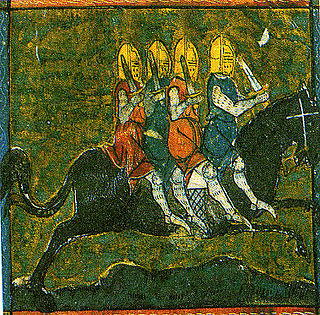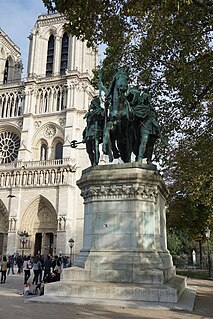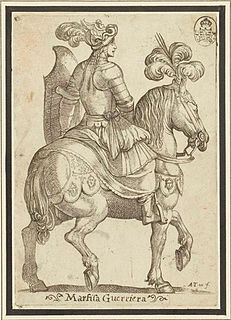Related Research Articles

Roland was a Frankish military leader under Charlemagne who became one of the principal figures in the literary cycle known as the Matter of France. The historical Roland was military governor of the Breton March, responsible for defending Francia's frontier against the Bretons. His only historical attestation is in Einhard's Vita Karoli Magni, which notes he was part of the Frankish rearguard killed in retribution by the Basques in Iberia at the Battle of Roncevaux Pass.

Orlando furioso is an Italian epic poem by Ludovico Ariosto which has exerted a wide influence on later culture. The earliest version appeared in 1516, although the poem was not published in its complete form until 1532. Orlando furioso is a continuation of Matteo Maria Boiardo's unfinished romance Orlando innamorato. In its historical setting and characters, it shares some features with the Old French Chanson de Roland of the eleventh century, which tells of the death of Roland. The story is also a chivalric romance which stemmed from a tradition beginning in the late Middle Ages and continuing in popularity in the 16th century and well into the 17th.

Bayard is a magic bay horse in the legends derived from the medieval chansons de geste. These texts, especially that of The Four Sons of Aymon, attribute to him magical qualities and a supernatural origin. He is known for his strength and intelligence, and possesses the supernatural ability to adjust his size to his riders.

Renaud de Montauban was a legendary hero and knight which appeared in a 12th-century Old French chanson de geste known as The Four Sons of Aymon. The four sons of Duke Aymon are Renaud, Richard, Alard and Guiscard, and their cousin is the magician Maugris. Renaud possesses the magical horse Bayard and the sword Froberge.

Orlando Innamorato is an epic poem written by the Italian Renaissance author Matteo Maria Boiardo. The poem is a romance concerning the heroic knight Orlando (Roland). It was published between 1483 and 1495.

Astolfo is a fictional character in the Matter of France where he is one of Charlemagne's paladins. He is the son of Otto, the King of England, and is a cousin to Orlando and Rinaldo, and a descendant of Charles Martel. While Astolfo's name appeared in the Old French chanson de gesteThe Four Sons of Aymon, his first major appearance was in the anonymous early fourteenth-century Franco-Venetian epic poem La Prise de Pampelune. He was subsequently a major character in Italian Renaissance romance epics, such as Morgante by Luigi Pulci, Orlando Innamorato by Matteo Maria Boiardo, and Orlando Furioso by Ludovico Ariosto.

Maugris or Maugis was one of the heroes of the chansons de geste and romances of chivalry and the Matter of France that tell of the legendary court of King Charlemagne. Maugis was cousin to Renaud de Montauban and his brothers, son of Beuves of Aygremont and brother to Vivien de Monbranc. He was brought up by Oriande the fairy, and became a great enchanter. He won the magical horse Bayard and the sword Froberge which he later gave to Renaud.

Oliver, sometimes referred to as Olivier de Vienne or de Gennes, is a legendary knight in the Matter of France chansons de geste, especially the French epic The Song of Roland. In the tradition, he was Roland's closest friend, advisor, confidant and brother-in-law to be, one of Charlemagne's twelve peers and brother of Aude, Roland's betrothed. He dies with Roland at the Battle of Roncevaux Pass. Some critics have linked his name to the olive tree, a biblical symbol of divine wisdom.

Fierabras or Ferumbras is a fictional Saracen knight appearing in several chansons de geste and other material relating to the Matter of France. He is the son of Balan, king of Spain, and is frequently shown in conflict with Roland and the Twelve Peers, especially Oliver, whose prowess he almost rivals. Fierabras eventually converts to Christianity and fights for Charlemagne.

Ferragut was a character—a Saracen paladin, sometimes depicted as a giant—in texts dealing with the Matter of France, including the Historia Caroli Magni, and Italian epics, such as Orlando Innamorato by Matteo Maria Boiardo and Orlando Furioso by Ludovico Ariosto. In the tales, he was portrayed as physically invulnerable except at his navel/stomach, and was eventually killed by the paladin Roland.
Historia Caroli Magni, also known as Historia Karoli Magni et Rotholandi and sometimes as the Turpin Chronicle or the Pseudo-Turpin Chronicle, is a 12th-century Latin forged chronicle of legendary material about Charlemagne's alleged conquest of Spain. It is also called Book IV – The Conquests of Charlemagne of the Codex Calixtinus. The chronicle states it was written by Charlemagne's contemporary Turpin, Archbishop of Reims, but it was found out as a medieval forgery. The work was extremely popular, and served as a major source of material on Charlemagne in chronicles, fiction and iconography throughout Medieval Europe. The miracles of the flowering lances and the death of Ferracutus appear on the windows of Chartres cathedral.

Angelica is a princess in the epic poem Orlando innamorato by Matteo Maria Boiardo. She reappears in the saga's continuation, Orlando furioso by Ludovico Ariosto, and in various later works based on the two original Orlando pieces. The narratives are part of the Matter of France, a cycle of legendary history stories based on the adventures of Charlemagne and his paladins.

Rodomonte is a major character in the Italian romantic epic poems Orlando innamorato by Matteo Maria Boiardo and Orlando furioso by Ludovico Ariosto. He is the King of Sarza and Algiers and the leader of the Saracen army which besieges Charlemagne in Paris. He is in love with Doralice, Princess of Granada, but she elopes with his rival Mandricardo. He tries to seduce Isabella but she tricks him into killing her by mistake. In remorse, Rodomonte builds a bridge in her memory and forces all who cross it to pay tribute. When the "naked and mad" Orlando arrives at the bridge, it is Rodomonte, the pagan, who throws him into the river below. They both swim ashore, but Orlando who is naked and is unimpeded by heavy armor gets to the shore first. Finally, Rodomonte appears at the wedding of Bradamante and Ruggiero and accuses Ruggiero of treason for converting to Christianity and abandoning the Saracen cause. The two fight a duel and Rodomonte is killed.

Ruggiero is a leading character in the Italian romantic epics Orlando Innamorato by Matteo Maria Boiardo and Orlando Furioso by Ludovico Ariosto. Ruggiero had originally appeared in the twelfth-century French epic Aspremont, reworked by Andrea da Barberino as the chivalric romance Aspramonte. In Boiardo and Ariosto's works, he is supposed to be the ancestor of Boiardo and Ariosto's patrons, the Este family of Ferrara, and he plays a major role in the two poems.

Marfisa is a character in the Italian romantic epics Orlando innamorato by Matteo Maria Boiardo and Orlando Furioso by Ludovico Ariosto. She is the sister of Ruggiero but was separated from him in early childhood. She becomes queen of India and fights as a warrior for the Saracens, taking part in the siege of the fortress Albracca until her sword is stolen by Brunello. She falls in love with Ruggiero, unaware who he is until Atlantes reveals their background. Learning that her parents were Christian, she converts to the faith and joins the Emperor Charlemagne's army against the Saracens.
Sacripante is a character in the Italian romantic epics Orlando innamorato by Matteo Maria Boiardo and Orlando furioso by Ludovico Ariosto. Sacripante is the King of Circassia and one of the leading Saracen knights. He is passionately in love with Angelica and fights to defend her when she is besieged in the fortress of Albracca. His horse Frontino is stolen from underneath him by the cunning thief Brunello. In Orlando furioso he offers to become the wandering Angelica's protector but she evades him.
Andrea Mangiabotti, called Andrea da Barberino was an Italian writer and cantastorie ("storyteller") of the Quattrocento Renaissance. He was born in Barberino Val d'Elsa, near Florence and lived in Florence. He is principally known for his prose romance epic Il Guerrin Meschino, his I Reali di Francia, a prose compilation of the Matter of France epic material concerning Charlemagne and Roland (Orlandino) from various legends and chansons de geste, and for his Aspramonte, a reworking of the chanson de geste Aspremont, which also features the hero Ruggiero. Many of his writings probably derive from Franco-Italian works, such as the Geste Francor, that includes versions of the stories of Reali di Francia and dates to the first half of the fourteenth century. His works, which circulated at first in manuscript, were extremely successful and popular, and were a key source of material for later Italian romance writers, such as Luigi Pulci (Morgante), Matteo Maria Boiardo and Ludovico Ariosto.

Veillantif (French), Vielantiu ; Vegliantin, Vegliantino or Brigliadoro (Italian) is the name of Roland the paladin's trustworthy and swift steed in the stories derived from the chansons de geste. The French name comes from an expression meaning "vigilant". Veillantif is first mentioned in The Song of Roland.
La Spagna, also called La Spagna in rima is a 14th-century Italian epic attributed to the Florentine Sostegno di Zanobi and likely composed between 1350 and 1360 The poem is in ottava rima, composed of 40 cantos each of about 40 octaves. The work is an adaptation of the story of Charlemagne's battles in Spain and the adventures of his nephew, the paladin Orlando (Roland), including the tale of his mortal duel with Ferraguto and his ultimate death at Roncesvalles.

Entrée d'Espagne or L'Entrée d'Espagne or Entrée en Espagne is a 14th-century (c.1320) Franco-Venetian chanson de geste. The author is thought to be from Padua. The work has survived in only one manuscript, today in the Biblioteca Marciana in Venice. Based on material from the Pseudo-Turpin Chronicle and several other sources, the epic poem tells of Charlemagne's battles in Spain and the adventures of the paladin Roland.
References
- Ludovico Ariosto. Orlando Furioso, verse translation by Barbara Reynolds in two volumes (Penguin Classics, 1975). Part one (cantos 1–23) ISBN 0-14-044311-8; part two (cantos 24–46) ISBN 0-14-044310-X
- Matteo Maria Boiardo. Orlando innamorato ed. Charles Stanley Ross (Oxford University Press,1995) ISBN 0-19-282438-4
- (in French) Geneviève Hasenohr and Michel Zink, eds. Dictionnaire des lettres françaises: Le Moyen Age. Collection: La Pochothèque. Paris: Fayard, 1992. ISBN 2-253-05662-6
- Luigi Pulci: Morgante: The Epic Adventures of Orlando and His Giant Friend a complete English translation by Joseph Tusiani. Introduction and notes by Edoardo Lèbano. (Indiana University Press, 1998) ISBN 0-253-21407-6